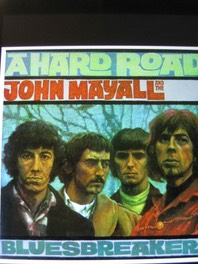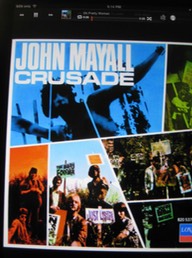 A Hard Road, recorded on five dates in October and November 1966, and released the following February, featured Mayall on guitar and keyboards with Green on lead guitar, John McVie on bass, Hughie Flint and Aynsley Dunbar on drums and a brass section comprising John Almond, Alan Skidmore and Ray Warleigh. Vocals are mainly Mayall, though Green takes the lead on You Don't Love Me and The Same Way. Writing credits mainly go to Mayall, though Green contributed two, including the prototype for Black Magic Woman (The Supernatural) and a quartet of covers You Don't Love Me, Elmore James' Dust My Broom, and Freddie King's The Stumble and Someday After A While (You'll Be Sorry). With the volume cranked a bit, it might sound dated, but there's some stinging lead work from Green and while we're talking a period piece it's a prime example of the emerging incarnation of British blues.
A Hard Road, recorded on five dates in October and November 1966, and released the following February, featured Mayall on guitar and keyboards with Green on lead guitar, John McVie on bass, Hughie Flint and Aynsley Dunbar on drums and a brass section comprising John Almond, Alan Skidmore and Ray Warleigh. Vocals are mainly Mayall, though Green takes the lead on You Don't Love Me and The Same Way. Writing credits mainly go to Mayall, though Green contributed two, including the prototype for Black Magic Woman (The Supernatural) and a quartet of covers You Don't Love Me, Elmore James' Dust My Broom, and Freddie King's The Stumble and Someday After A While (You'll Be Sorry). With the volume cranked a bit, it might sound dated, but there's some stinging lead work from Green and while we're talking a period piece it's a prime example of the emerging incarnation of British blues.
 Apparently cut in a single session on 12 July 1967 at Decca West Hampstead Studios and released two months later, Crusade had Mayall and McVie from the previous lineup with Mick Taylor replacing Green, Keef Hartley taking over the drum stool and Chris Mercer and Rip Kant coming in to play sax.
Apparently cut in a single session on 12 July 1967 at Decca West Hampstead Studios and released two months later, Crusade had Mayall and McVie from the previous lineup with Mick Taylor replacing Green, Keef Hartley taking over the drum stool and Chris Mercer and Rip Kant coming in to play sax.
As with A Hard Road, the dozen tracks on the original album are split roughly half and half (actually, five-seven) between original material and covers, with the instrumental Snowy Wood standing out from the vocal tracks. The Mayall/Taylor Snowy Wood and Freddie King's Driving Sideways are the album's highlights, but there's tasty guitar throughout and the addition of the horn section adds light and shade that would be explored a little further on Diary of a Band and Bare Wires before Mayall pared things back on Blues from Laurel Canyon.
While some might be inclined to use the rough as guts official bootleg recordings on Diary of a Band as the transition, Crusade marks the transition point between the blend of covers and originals that had been the rule up to this point. As with the preceding albums there are substantial instrumental chops on display throughout Crusade, but in an environment where boundaries were being stretched original material seemed to be increasingly de rigeur, which to me, at any rate.
As a result, A Hard Road and Crusade come across as rather retro, but they've also got a certain period charm that dissipated as Mayall and company yielded to what I've come to describe as the prog rock impulse towards complexity and virtuosity for the sake of virtuosity, explains the side long suite that opened Bare Wires and the thematic song cycle that was Blues from Laurel Canyon.